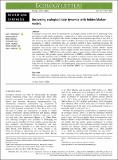Uncovering ecological state dynamics with hidden Markov models
Abstract
Ecological systems can often be characterised by changes among a finite set of underlying states pertaining to individuals, populations, communities or entire ecosystems through time. Owing to the inherent difficulty of empirical field studies, ecological state dynamics operating at any level of this hierarchy can often be unobservable or ?hidden?. Ecologists must therefore often contend with incomplete or indirect observations that are somehow related to these underlying processes. By formally disentangling state and observation processes based on simple yet powerful mathematical properties that can be used to describe many ecological phenomena, hidden Markov models (HMMs) can facilitate inferences about complex system state dynamics that might otherwise be intractable. However, HMMs have only recently begun to gain traction within the broader ecological community. We provide a gentle introduction to HMMs, establish some common terminology, review the immense scope of HMMs for applied ecological research and provide a tutorial on implementation and interpretation. By illustrating how practitioners can use a simple conceptual template to customise HMMs for their specific systems of interest, revealing methodological links between existing applications, and highlighting some practical considerations and limitations of these approaches, our goal is to help establish HMMs as a fundamental inferential tool for ecologists.
Citation
McClintock , B T , Langrock , R , Gimenez , O , Cam , E , Borchers , D L , Glennie , R & Patterson , T A 2020 , ' Uncovering ecological state dynamics with hidden Markov models ' , Ecology Letters , vol. Early View . https://doi.org/10.1111/ele.13610 , https://doi.org/10.1111/ele.13610
Publication
Ecology Letters
Status
Peer reviewed
ISSN
1461-023XType
Journal article
Description
This research was inspired in part by the SFB TRR 212 (NC3), which is funded by the German Research Foundation (DFG).Collections
Items in the St Andrews Research Repository are protected by copyright, with all rights reserved, unless otherwise indicated.
Related items
Showing items related by title, author, creator and subject.
-
From theory to practice in pattern-oriented modelling : identifying and using empirical patterns in predictive models
Gallagher, Cara A.; Chudzinska, Magda; Larsen-Gray, Angela; Pollock, Christopher J.; Sells, Sarah N.; White, Patrick J. C.; Berger, Uta (2021-05-12) - Journal articleTo robustly predict the effects of disturbance and ecosystem changes on species, it is necessary to produce structurally realistic models with high predictive power and flexibility. To ensure that these models reflect the ... -
Accounting for preferential sampling in species distribution models
Pennino, Maria Grazia; Paradinas, Iosu; Illian, Janine B.; Muñoz, Facundo; Bellido, José María; López-Quílez, Antonio; Conesa, David (2019-01-01) - Journal articleSpecies distribution models (SDMs) are now being widely used in ecology for management and conservation purposes across terrestrial, freshwater, and marine realms. The increasing interest in SDMs has drawn the attention ... -
A Double machine learning trend model for citizen science data
Fink, Daniel; Johnston, Alison; Strimas-Mackey, Matt; Auer, Tom; Hochachka, Wesley M.; Ligocki, Shawn; Oldham Jaromczyk, Lauren; Robinson, Orin; Wood, Chris; Kelling, Steve; Rodewald, Amanda D. (2023-09-01) - Journal article1. Citizen and community science datasets are typically collected using flexible protocols. These protocols enable large volumes of data to be collected globally every year; however, the consequence is that these protocols ...

